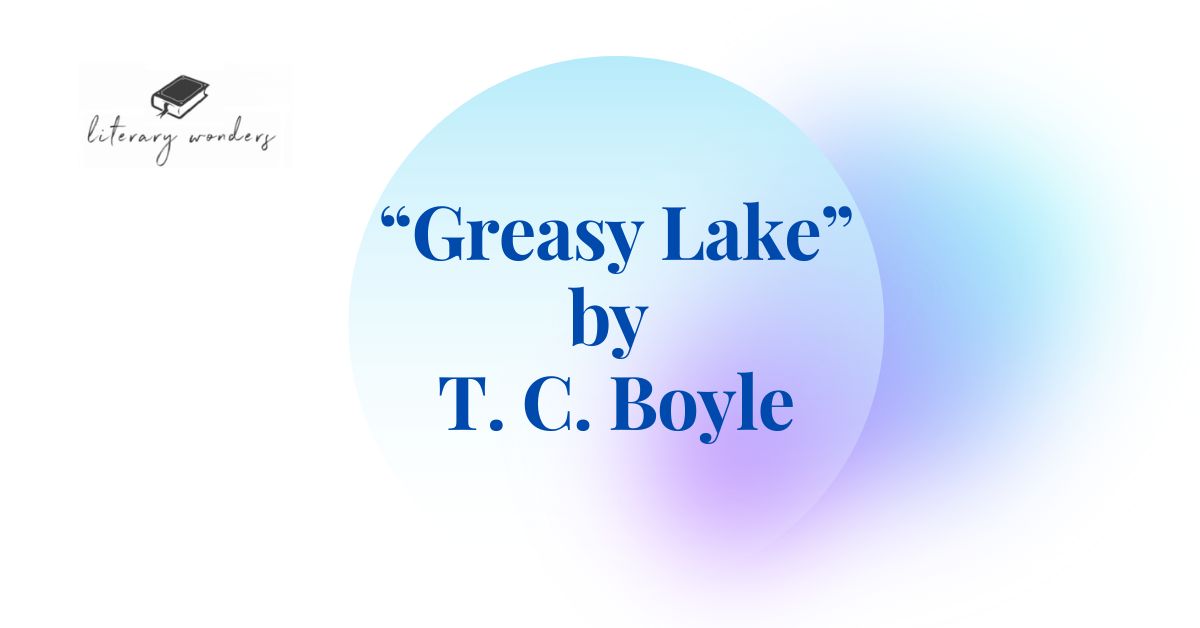Summary of “Greasy Lake”
“Greasy Lake” is a short story by T.C. Boyle, published in 1985. It follows the lives of three young men on a mission to prove their toughness and bravery. The story takes place in the late 1960s, and the setting is a lake that was once a popular hangout for teens but has now become a seedy and dangerous place. The three boys are eager to live on the edge of this lake and engage in dangerous and illegal activities. They describe themselves as “bad characters,” but they are simply misguided young men searching for a sense of purpose and identity.
One night, they come across a man who is threatening and aggressive, and the situation quickly spirals out of control. The boys soon realize that they have bitten off more than they can handle, and they are forced to confront the reality of their actions. The story’s climax is a violent confrontation that leaves one of the boys injured and the others shaken. The night events force the boys to reevaluate their priorities, and they understand that their quest for toughness and bravery is nothing more than a false sense of heroism.
The story is a commentary on the dangers of trying to live on the edge and the consequences of reckless behavior. It is a cautionary tale for young people seeking identity and purpose. The story’s ending is left open-ended, but it is implied that the boys have learned a valuable lesson and will move forward with a newfound sense of maturity and responsibility. “Greasy Lake” is a thought-provoking and intense story that will leave a lasting impression on the reader.
Analysis of “Greasy Lake”
“Greasy Lake” is a coming-of-age story set in the 1960s that follows three young men as they navigate a summer evening of wild behavior and criminal acts. The title refers to a murky lake near their homes, where they gather to drink, smoke, and engage in illicit activities.
The story is notable for its vivid descriptions of youthful rebellion and the moral decay of its characters. The unnamed protagonist is the narrator and describes his experiences in a wry, detached tone. The story is structured around a series of events, each of which pushes the protagonist closer to realizing his immaturity and the consequences of his actions.
Throughout the story, Boyle explores themes of conformity, identity, and the loss of innocence. The protagonist and his friends are searching for meaning and a sense of purpose, and they believe that rebelling against the norms of society will bring them the sense of excitement and adventure they crave. However, their antics are futile, leaving them with a sense of emptiness and disappointment.
The setting of “Greasy Lake” is also significant, as it provides a backdrop for the protagonist’s journey. The lake is murky, dark, and dangerous, symbolizing the protagonist’s descent into a world of chaos and violence. The use of the lake as a symbol of moral decay is also a commentary on the societal changes taking place during the 1960s, as traditional values and norms were being questioned and rejected.
Major Themes in the Story
The story follows various universal and conventional themes that are as follows.
- Coming of Age: The narrator and his friends experience a rite of passage into adulthood as they learn about the consequences of their actions and the reality of life.
- Recklessness and Irresponsibility: The characters are portrayed as carefree and irresponsible, engaging in dangerous and illegal activities without considering the consequences.
- The Ugly Side of Suburban Life: The story explores the underbelly of suburban life and the reality that even seemingly idyllic communities can have their dark secrets and dangerous characters.
- The Search for Identity: The narrator is searching for his true identity, both as an individual and as part of a group, and must navigate the complexities of his relationships with his friends and his own moral code.
- The Loss of Innocence: The characters face the loss of their innocence and naivete as they confront the brutal reality of the world.
- Violence: The story raises questions about the nature of violence and the ease with which it can escalate in the face of fear, anger, and impulsiveness.
- Appearance and Reality: The story highlights the gap between the idealized image of suburban life and the harsh reality of its darker aspects.
- Peer Pressure: The characters are influenced by their peers, leading them to engage in dangerous and destructive behavior. The story highlights the importance of standing up for one’s beliefs and values, even in the face of peer pressure.
Conclusion
To conclude, “Greasy Lake” is a powerful and evocative story that explores the complexities of youthful rebellion and the search for identity. Boyle’s use of vivid descriptions, symbols, and themes creates a memorable and thought-provoking narrative that continues to resonate with readers decades after its publication.
Suggested Readings

